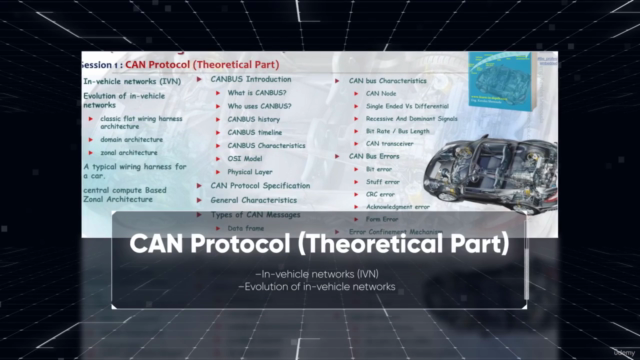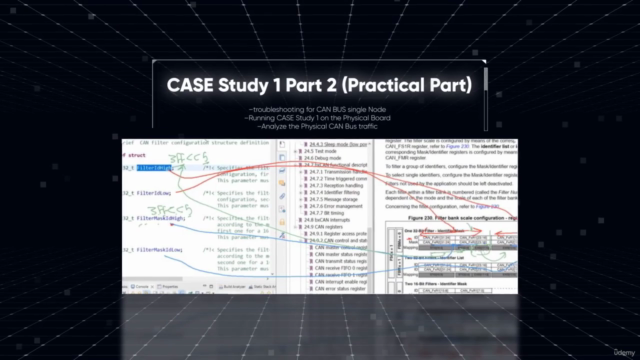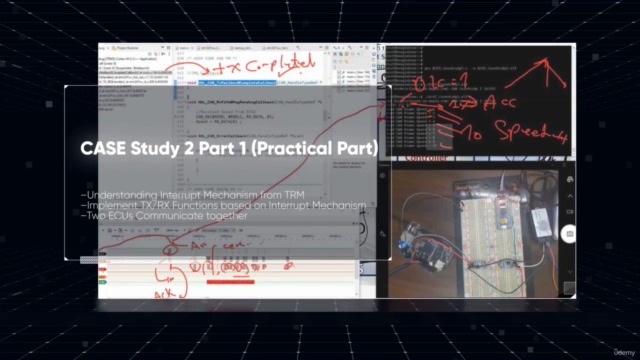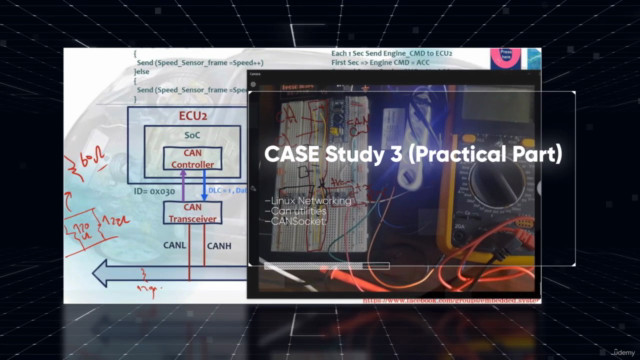Master CAN for embedded system learn-in-depth (Arabic)

Why take this course?
🚀 Master CAN for Embedded Systems: A Deep Dive into the Controller Area Network (Arabic)
Course Title: 🎓 Master CAN for Embedded System Learn-in-Depth (Arabic)
🧭 What You'll Learn:
Theoretical & Practical Insights into CAN Protocol:
-
CAN Protocol Basics: Get acquainted with the fundamentals of CAN protocol, including its frames and characteristics. Learn how to read from a CAN controller using Technical Reference Manuals (TRM) for various Systems on a Chip (SoC).
-
In-Vehicle Networks (IVN): Dive into the evolution of in-vehicle networks, understanding the transition from classic flat wiring harness architecture to domain and zonal architectures. 🚗🔧
-
CANBUS Introduction: Uncover what CANBUS is, who uses it, its history, timeline, and characteristics within the Open Systems Interconnection (OSI) model, focusing on the physical layer.
-
CAN Protocol Specification and General Characteristics: Explore the types of CAN messages, such as data frames, remote frames, error frames, and overload frames. 📜🔎
-
CAN Bus Characteristics: Learn about CAN node architecture, single-ended vs differential signaling, recessive and dominant signals, bit rate, bus length, and the role of CAN transceivers.
-
CAN Bus Errors: Get to grips with different types of errors on the CAN bus, including bit, stuff, CRC, acknowledgment, and form errors, and understand the error confinement mechanism. 🚨
-
CAN Bit Monitoring and Stuffing: Delve into the intricacies of CAN bit timing calculation and how to use simulation mode for debugging.
🛠️ Practical Application with Real-World Case Studies:
Case Study 1: Reading CAN Controller from TRM (Cortex M3)
-
Learn how to read a CAN controller from the Technical Reference Manual (TRM) for a SoC based on Cortex M3. 🔬📚
-
Understand CAN bit timing, and implement TX (Transmit) and RX (Receive) mechanisms using polling and interrupt mechanisms.
-
Discover filtration mechanisms and retransmission mechanisms based on errors.
-
Utilize CAN test modes and apply the knowledge gained in a real-world scenario by running the case study on a physical board, analyzing CAN bus traffic, and troubleshooting issues. 💡🖥️
Case Study 2: Understanding Interrupt Mechanism from TRM
-
Grasp the interrupt mechanism detailed in the TRM for implementing TX/RX functions.
-
Experiment with two ECUs (Electronic Control Units) communicating together on a physical board.
-
Identify and resolve different issues encountered on a CAN bus physically. 🤝⚙️
Case Study 3: Linux Networking & SocketCAN
-
Explore Linux networking concepts and the SocketCAN framework, including understanding kernel modules that support CAN.
-
Master can utilities and learn how to use CAN sockets for reading frames, setting up filters, and sending frames using Python scripts or equivalent programming languages. 🧩🚀
Join us on this comprehensive journey through the world of CAN networking in embedded systems, where you will gain both theoretical knowledge and hands-on experience that will enable you to tackle real-world challenges with confidence! 🌟🔌
Course Gallery




Loading charts...